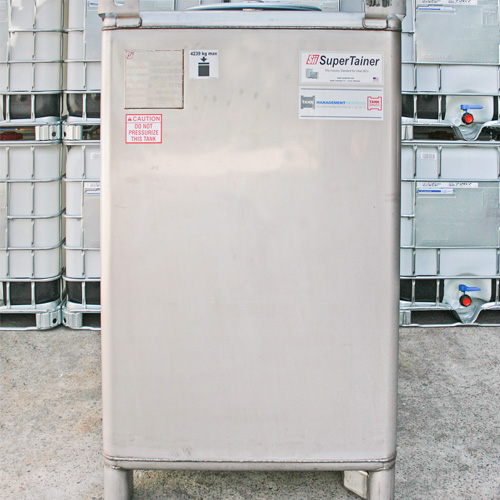
The Advantages of Stainless Steel IBCs in the Food and Beverage Industry
Efficient storage and transport solutions are essential in the competitive and highly regulated food and beverage industry. The growing popularity of stainless steel IBCs (Intermediate Bulk Containers) within this sector is no accident. Designed to offer a superior solution for liquid storage and transportation, these containers meet the demands of food manufacturing, breweries, wineries, and other businesses handling sensitive products. Here, we explore the advantages of these containers, showing how they optimise storage, protect product quality, and help businesses comply with safety standards.
Space Efficiency and Maximised Storage
Food and beverage businesses, such as breweries and wineries, often contend with limited space in storage facilities. Stainless steel IBCs are stackable, allowing companies to maximise available storage areas. Unlike plastic or single-use containers, these units are built for durability and stability when stacked, helping businesses make the most of vertical space. By stacking IBC tanks securely, food processors can reduce the footprint of their storage areas, freeing up room for additional production or inventory.
Hygienic and Food-Safe Design
When it comes to storing consumable products, hygiene is of paramount importance.Stainless steel IBCs offer an optimal solution because they are non-porous, preventing bacteria, odours, or contaminants from being absorbed into the container walls. Unlike plastic alternatives, which can degrade over time and absorb substances, these containers maintain their integrity even after repeated use. The smooth, polished surface makes them easy to clean and sterilise, ensuring that food and beverage products remain uncontaminated and meet strict health regulations.
Durability for Harsh Environments
Stainless steel is a robust and resilient material, capable of withstanding harsh conditions common in food processing and distribution. The food and beverage industry demands containers that can endure everything from extreme temperatures to the rigours of long-haul transport. These IBC tanks are designed to resist corrosion, rust, and impact damage, ensuring they remain reliable and intact even in challenging environments. This durability not only helps protect the quality of the stored products but also extends the life of the containers, reducing the need for frequent replacements.
Versatile Applications Across the Industry
From fruit juices and wines to dairy products and oils, the food and beverage industry handles a vast array of liquids, each with specific storage requirements. Stainless steel IBCs come in a variety of sizes and can be adapted to store a wide range of liquid and semi-liquid products. This versatility is especially valuable in industries such as brewing and winemaking, where containers must handle both raw ingredients and finished products. These containers offer a flexible solution forliquid storage with IBC tanks, supporting the storage, fermentation, and maturation of products and making them indispensable across multiple stages of the production process.
Cost-Effective Over Time
Although the initial investment in these containers may be higher than other storage options, the long-term benefits offer significant cost savings. They are reusable, easy to maintain, and built to last, minimising the need for continuous purchases of new storage. Additionally, their durability means fewer replacements and reduced repair costs. For food and beverage businesses, particularly those looking to optimise operational costs without compromising quality, stainless steel IBCs represent a cost-effective storage solution that pays dividends over time.
Safety and Compliance with Industry Standards
Regulatory compliance is crucial in the food and beverage industry, and stainless steel IBCs are often designed to meet stringent safety and hygiene standards. They are manufactured to prevent leaks, spills, and contamination, ensuring that they align with food safety requirements. With secure lids, pressure relief vents, and other safety features, these containers provide confidence that sensitive products are handled in compliance with regulations. This compliance is essential not only for consumer safety but also for maintaining a reputable brand image within the competitive food market.
Optimise Your Operations Today with Stainless Steel IBCs
Investing in stainless steel IBCs brings a multitude of advantages to food and beverage businesses, from enhanced safety and hygiene to long-term cost savings and compliance with industry standards. By choosing IBC tanks, companies can secure product quality, streamline storage and transport, and foster customer trust. Optimise your operations and explore how these IBCs can transform your food and beverage business today!







 Previous article
Previous article